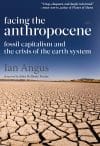
In this interview with Claudia Antunes of Brazilian magazine Sumaúma, Ian Angus takes stock of our current planetary crisis, from its origins in Marx’s ecological thought and the present debate over its designation to the future of human civilization as we know it. “The key question is,” he concludes, “Are we going to see large number of people moving for change?” | more…

A unique historical account of poor peoples’ self-defence strategies in the face of the plunder of their lands and labor
For five centuries, the development of capitalism has been inextricably connected to the expropriation of working people from the land they depended on for subsistence. Through ruling class assaults known as enclosures or clearances, shared common land became privately-owned capital, and peasant farmers became propertyless laborers who could only survive by working for the owners of land or capital.
As Ian Angus documents in The War Against the Commons, mass opposition to dispossession has never ceased. His dramatic account provides new insights into an opposition that ranged

What did Marx mean in his discussion of “so-called primitive accumulation” in Capital? Here, Ian Angus argues that the term is widely misunderstood—but its illumination reveals great insight to the conditions of exploitation and expropriation. | more…

The Fishing Revolution is a rarely explored, yet critical, event in the evolution of capitalism. Ian Angus elaborates on this revolution in the global marketplace and its role as a cornerstone of imperialism, colonialism, and capitalism in the sixteenth and seventeenth centuries. | more…

In the past and in his own time, Marx has been portrayed as endorsing the enclosure of the commons as a necessary historical stage on the path to socialism. However, a more accurate account, one that is critical of the enclosure movement, can be found in his response to the destruction of commons-based peasant communities in Russia—while it was actually happening. | more…

Scientific knowledge and debates in Anthropoene science have developed over the years, particularly in the two main fields involved: geology, which has mainly been concerned with formally defining the new epoch; and Earth System science, which studies the global biological, chemical, and physical changes that are reshaping the conditions of life on this planet. | more…

A Forgotten Chapter in the Working-Class Fight for Democratic Rights
November 5, 2019, is the 225th anniversary of the acquittal of Thomas Hardy on charges of High Treason. Hardy is nearly forgotten today, but for decades workers and democrats in England celebrated November 5 as the anniversary of a major victory, a triumph over a powerful state that had deployed immense resources to crush working-class organizations and suppress popular demands for democratic rights. | more…

The promise of a world without disease has been replaced by warnings of evermore virulent pathogens, created by the very drugs that were supposed to save us. Scarcely a day passes without more news of people contracting infections or infectious diseases that cannot be cured by the strongest medicines available. Antimicrobial Resistance is a global health crisis driven by two major factors: the spectacular ability of bacteria to adapt to threats, and a pharmaceutical industry and health care system that puts profit before people. In addition to devastating climate change, the Anthropocene may be defined by epidemics that medicine cannot cure. | more…

Environmental Crisis and Metabolic Rift in Nineteenth-Century London
The accumulation of human excrement in nineteenth-century cities, particularly London, precipitated a historic environmental crisis—an aspect of the metabolic rift mostly overlooked in ecosocialist analysis. The solution that was finally adopted only shifted the problem out of sight, setting the stage for even greater crises in our time. | more…

As the Anthropocene advances, people across the red-green political spectrum seek to understand and halt our deepening ecological crisis. Environmentalists, scientists, and ecosocialists share concerns about the misuse and overuse of natural resources, but often differ on explanations and solutions. Some blame environmental disasters on overpopulation. Others wonder if Darwin’s evolutionary theories disprove Marx’s revolutionary views, or if capitalist history contradicts Anthropocene science. Some ask if all this worry about climate change and the ecosystem might lead to a “catastrophism” that weakens efforts to heal the planet. | more…

The Forgotten Legacy of Carl Schorlemmer
Most accounts of Marx and Engels’s lives, if they mention Carl Schorlemmer (1834–92) at all, refer to the renowned chemist only as a friend, without acknowledging his influence on their studies of the natural sciences. It is time to restore this neglected figure to his rightful place in the Marxian—and Engelsian—tradition. | more…

Science tells us that a new and dangerous stage in planetary evolution has begun—the Anthropocene, a time of rising temperatures, extreme weather, rising oceans, and mass species extinctions. Humanity faces not just more pollution or warmer weather, but a crisis of the Earth System. If business as usual continues, this century will be marked by rapid deterioration of our physical, social, and economic environment. Large parts of Earth will become uninhabitable, and civilization itself will be threatened. Facing the Anthropocene shows what has caused this planetary emergency, and what we must do to meet the challenge. | more…
The word Anthropocene, unknown twenty years ago, now appears in the titles of three academic journals, dozens of books, and hundreds of academic papers, not to mention innumerable articles in newspapers, magazines, websites, and blogs. There are exhibitions about art in the Anthropocene, conferences about the humanities in the Anthropocene, and novels about love in the Anthropocene. There is even a heavy metal album called The Anthropocene Extinction. Rarely has a scientific term moved so quickly into wide acceptance and general use.… Behind what might appear to be just a trendy buzzword are important scientific discussions that have radical implications for the future of life on Earth. | more…









